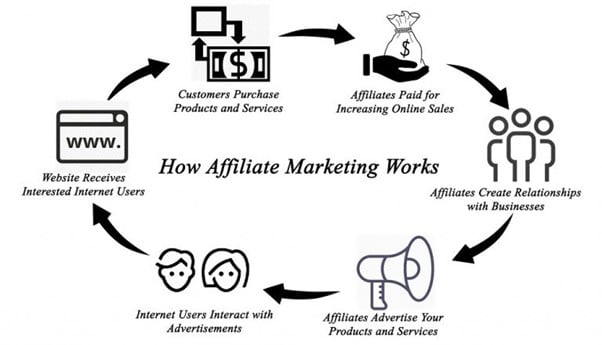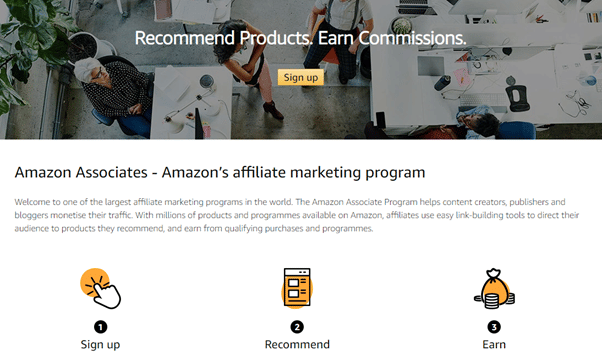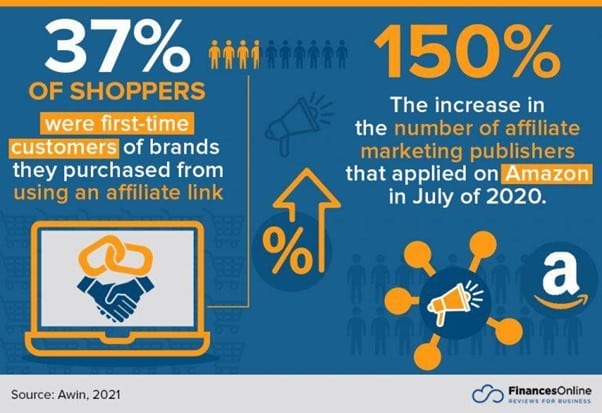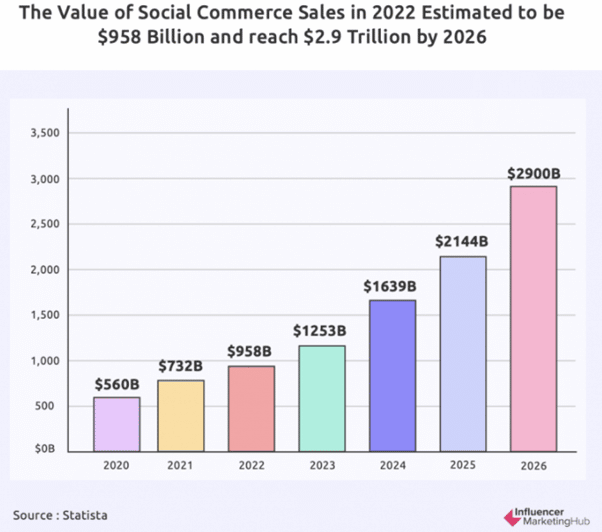The right marketing strategy is essential to driving ecommerce traffic and boosting sales. Most methods focus on actively targeting existing or potential customers who know about your brand. But how do you grow past this established audience and reach a brand new pool of customers?
Through affiliate marketing, you can form valuable and profitable partnerships. It gives you access to new audiences and increases your passive income streams.
Let’s see how to find the right affiliates for your business.
IMAGE: UNSPLASH
First, What Is Affiliate Marketing?
Affiliate marketing is a type of performance-based marketing where affiliates get rewarded for each customer referred to a business.
For instance, if your ecommerce store sells mugs, your affiliates promote your products with an affiliate referral link or discount code. When someone clicks on the link, they’re sent to your mug store. A tracking code in the referral link or discount code tells you the customer was sent to your store by the affiliate, who gets a commission from the subsequent sale.
This type of marketing model is pay-per-sale. It only pays commission on affiliate sales, making it cost-effective for your business. Other benefits include:
- Faster ecommerce growth
- Trusted affiliates boost brand reputation and legitimacy
- Broadens your audience by increasing brand awareness and targets the right customers
- Trackable/measurable
- Increased traffic to your website and social channels
How Do You Find The Right Affiliates?
Finding affiliates is like applying for a job. But instead of submitting a resumé to an organization, you’re reaching out to individuals. There are four steps to follow to ensure you’re reaching the right affiliates in the right way.
1. Find Relevant Affiliates
Getting this step right is vital to building your affiliate marketing program. We’ll go through the different ways to find affiliates in the next section. Here, we’ll look at the qualities you should be looking for in your affiliates:
- Consistently produce creative content
- Appeal to the same target audiences/social channels you do
- Have a willingness to adapt to your marketing strategies and learn new methods
- Are team-oriented and focused on building and maintaining long-term relationships
- Are passionate, enthusiastic, and authentic in their messaging
- Have high audience engagement
- Have an interest in your product/industry area
You can use partnership marketing or affiliate software tools, keyword research, and affiliate agencies to create a pool of prospects and narrow them down with the desirable qualities above.
It’s best to look for affiliates who aren’t promoting your competitors. However, it can sometimes work to your advantage by comparing your product with the competition. For example, tech YouTubers and influencers partner with competing companies to showcase new and exciting technology to their audience.
2. Reach Out To The Affiliates
There are several ways to reach out to potential affiliates. You can send emails, social media direct messages, go through affiliate agencies, or target online affiliate communities. Whichever communication method you use, ensure you follow these best practices:
- Consider reaching out to affiliates as being like applying for a job. Outline who you are, what your business does, and why you’d like to form a partnership
- Leave comprehensive contact details and links to your website, affiliate program landing page, and links to other affiliates you currently have
- Use attractive incentives and commission to draw them in. For instance, they might receive your latest product for free or get a bag of goodies for partnering with you
- Be honest and upfront. Don’t promise anything you can’t deliver, and avoid vague or complicated legal terms to hide disadvantages. A bad review from an affiliate could risk your brand reputation, future partnerships, and customers
IMAGE: DOT KNOWLEDGE
3. Sign Them Up
When your affiliates respond, there are three ways they might do it:
- Yes, I’d love to learn more and partner with you
- I’m not sure. I normally only do paid sponsorships
- No
Ignore the “no” group. Focus on the ones that want to learn more and partner with you. They’ll be the easiest to sign up, driving your affiliate marketing strategies forward in no time. Conduct this effectively by having readily available information about your affiliate program, such as:
- A comprehensive affiliate landing page or email template
- A sign-up page with terms and conditions
- Media assets, content, and brand guidelines so your prospective affiliates can start immediately
Not everyone works on a pay-per-sale basis. Some influencers and partners prefer sponsorship deals. For instance, brands often sponsor videos for YouTube creators, receiving product advertisements in return. You can decide if this is the route for you or not.
Remember, some influencers or creators may be hesitant to take the first step into the new affiliate marketing world. Address their concerns, and assure them you’ll provide plenty of support. Who knows, you might get a valuable affiliate relationship out of it.
4. Manage Your Affiliate Campaigns
Once your affiliates are onboard and the legal documents are all signed, you need to manage your partnerships. Affiliates do more than promote a single campaign. If utilized correctly, they can become outstanding brand ambassadors and valuable partners for your business.
Consider using CRM and partnership marketing tools for tracking affiliate marketing strategies. Analyze your affiliates to find the best performers and see where you should be investing your resources.
It’s vital throughout your affiliate relationship that you provide continuous content, update discounts, and gather feedback regularly from your partners to see how you can better support them. By being on the same page, you and your affiliates can form long-lasting and profitable relationships that benefit you both.
IMAGE: AFFILIATE PROGRAM
6 Ways To Find Affiliates For Your Business
1. Look To Niche Blogs
Niche products, like fountain pens, can be tough to sell. But bloggers are passionate and enthusiastic creators with established audiences and a trusted online reputation. They can be excellent affiliates to tell compelling stories of your brand and sell your products.
Identify niche bloggers whose audience overlaps with your own to form affiliate partnerships. It’s as simple as doing a keyword search. It can drive affiliate traffic, brand awareness, and legitimacy.
2. Reach Out To Influencers And Creators
Social media influencers and creators are ideal affiliates as they, well, influence people. Many have even turned their channels into businesses, using their content creation to earn a living. As well as building strong trust with their loyal followers, they’re capable of crafting creative messages, videos, stories, and compelling content. It can be massively beneficial to your brand, providing exciting new content.
Don’t worry about the number of followers here. A small yet loyal audience yields much better conversion rates. Instead, look for social media influencers that have:
- Similar audiences to you
- Expertise or can add to your social strategies
- Consistently high audience engagement
- An authentic and personal voice
- Use the same platforms your target customers use, e.g., Twitter, Instagram, TikTok, YouTube
3. Capitalize On Online Communities
Forums and groups are still popular places for customers to share brand information and reviews. For example, Reddit has millions of subreddits with communities sharing thoughts, ideas, and products.
You can use these online communities to find active members and offer your affiliate program. Most forums, like Facebook groups, pages, or Reddit, have private messaging and bio descriptions available. Partners can post affiliate links in their bio descriptions and direct prospects to it the next time they post or answer a question.
IMAGE: FINANCE ONLINE
4. Team Up With Coupon Sites
Customers regularly look to coupon sites for discounts. By teaming up with coupon sites and promoting your brand, products, or discounts, you appeal to a wider scope of customers and improve your conversion rate optimization.
5. Partner With Complementary Sites
Many companies share similar target audiences. For instance, toothpaste and toothbrush manufacturers will often partner with dentists to promote their products and give away free samples to their patients.
Identify companies that have similar customers and provide complementary services. It can boost brand awareness, affiliate partnerships, and affiliate sales. Ask to partner with these sites, and use cross-promotion as an incentive to bring them onboard.
For instance, imagine you’re a luggage company. A travel agency partner can promote affiliate links and provide discounts codes or deals for customers. You provide similar discounts, affiliate links, and deals to your customers, creating a profitable, collaborative relationship.
6. Turn Your Customers Into Affiliates
When customers are happy with your products, they become brand advocates, extolling your virtues to their network for free. While some companies use referral or loyalty programs to increase customer brand advocates, why not reach out personally and add them to your referral program?
They’ll receive a commission for the free promotion they currently do and will be enticed to do more. It shows appreciation to your customers, drives customer loyalty, and considerably expands your affiliate program. Ensure you don’t take on more customer affiliates than you can manage. Too much of a good thing can be bad for you.
IMAGE: INFLUENCER MARKETING HUB
Find Affiliates In The Likeliest Of Places
There are many benefits to using an affiliate for business marketing strategies, from faster ecommerce growth to increased brand awareness and legitimacy. It can be vital for new businesses to scale up and establish themselves in the market.
But finding affiliates who are the right fit doesn’t need to be exhausting. They’re in the same places you go to discover information about new brands or products. By looking in the areas where your customers spend their time, you can find plenty of dance partners for your business.
The trick is to identify the ones that will be most valuable to you. Don’t look for the highest followers or website views, but consistent audience engagement and an authentic, trusted voice. Offer attractive commissions and incentives to coax them onboard. Manage your affiliate relationships by providing support where needed, and you’ll grow customer bases and passively power your business success.
IMAGE: UNSPLASH
If you are interested in even more business-related articles and information from us here at Bit Rebels, then we have a lot to choose from.






COMMENTS